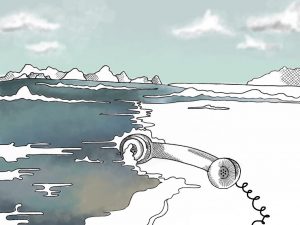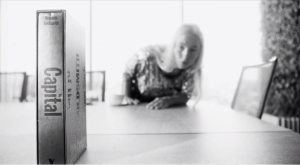British Bombs: The Rise of Declan McKenna
by Joe Wald | February 24, 2024

Sitting in silence on a Zoom call with a group of strangers and waiting for Declan McKenna to appear is a peculiar experience. We are all students, amateurs, hyper-self-aware and never more acutely aware of our immaturity than in this very moment. What do people do with their hands on a Zoom call? Are my shoulders too high? Neck too long? Eye contact is impossible in a Zoom call, but I seem to share a moment of recognition with the only other man in the group, who has also opted to wear a sleeveless jumper with a collared shirt. Are you supposed to dress up as the person you’re interviewing? Strength in numbers, I suppose.
Exactly how we got here, my radio show co-host Elyse and I, I’m not entirely sure. We are the proud presenters of a weekly show, ‘Music Memoirs’, on Oxide Radio, where we play music that we like, talk about it, ask each other nonsensical questions, host guests and ask them nonsensical questions. Our live listenership once reached the dizzying heights of four people all at once, but we haven’t let stardom get to our heads. In spite of this, it felt a little strange to announce to our listenership that last week’s guest was my flatmate Rob, and this week’s was the platinum-record-wielding 2017 BBC Introducing Artist of the Year. They probably didn’t believe a word, all four of them.
Excited chatter mingles with anxious silence while we wait. “What do you think of the song …”, “When I saw him in …”, “What do you think this lyric means?” “We can ask him!”: the sounds of aspiring journalist McKenna megafans quivering in anticipation. A hushed “here we go” from the host of the call as the ‘1 person in the waiting room’ notification rebounds off her face. It’s not McKenna, but his manager, checking the coast is clear, I presume. A beat, and there he is, a name, then a video, then the floating head of one of British indie pop’s biggest hitters of the last ten years. He is wearing a red hoodie with the hood down, exposing his bedhead.
Declan McKenna broke onto the alternative music scene with the hit single ‘Brazil’, a catchy track complete with an addictive electric guitar line and smooth-crooned lyrics about FIFA corruption at the 2014 World Cup in Brazil. He has harnessed his originality and successfully ridden out his explosive rise to renown, now boasting three studio albums, three EPs, and twenty-two singles. His most recent album, What Happened To The Beach, has just been released at a launch event at the Oxford O2 Academy.
A thin grin runs across his unshaven face as the host honks “Hi, Declan!” into her microphone. “Hello!” – with a word, everyone feels at ease. “How’s your day going?”, she asks him, to which he replies honestly, “It’s good, it’s barely really got started yet!”. The host introduces him and his new album, and he covers his understandable discomfort with a blushing “woo!”.
UCL’s Rare FM leads off by asking Declan about the story behind his new album. The album was born out of the pandemic, he says. “In lockdown, I really got back into making music as a hobby or almost like procrastination … I started working on music a bit differently, working on a different kind of music. It was something closer to getting back to being a teenager in some kind of way, you know, letting a bit looser with my writing process.”
He was just writing, he says, and didn’t realise he was writing an album. He tells of a long trip to LA where he worked with producer Luca Buccellati. He played Buccellati some 40 songs in one night and gradually they cut down the material to what started to look more like an album. This album was written as a form of ‘escapism’, with ‘lyrics that seemed to kind of just spew out’.
Next is Portsmouth Uni’s Pure FM on the album artwork, a worm’s-eye shot of McKenna with a metal detector in a field of cows. “It almost looks like a spaceship above the cows about to abduct the cows”. He adds, “I liked that.” In a further discussion of the intentions of the album, he claims a ‘theme of authenticity, of knowing and being yourself’, with the caveat that, ‘looking back I can see themes, but they weren’t really intentional’.
“And now we’ve got Oxide Radio…” I suck in a deep breath, unmute, and as I begin my question, Declan’s on the move. I pause, and with a nervous chuckle I ask, “Is everything alright?” “Hello! Yep, just running around my house trying to find a quiet spot.” He urges me to continue, and I spew out a slightly overlong question on where musical inspiration meets originality in the context of recent comparisons made between him and Paul McCartney.
“Yeah, it’s an interesting one. I kind of at points feel like you can only put out what you take in, and you have to take in different influences to give out something fresh. But at the same time, I know artists who try to avoid listening to too much music to avoid destroying their essence, or whatever it is. … Over time, I think your expression gradually becomes more original and you understand what it is that makes up you, and what’s just influences.”
He says he doesn’t shy away from receiving influence, illustrating the paradox that it is in many ways your influences that make you unique. A person’s taste is composed of many unoriginal things which in combination form something individual and new. McKenna goes on to discuss such influences, in particular Bowie, and the importance of space throughout his work up to this point. “It’s just the perfect analogy sometimes”, he claims, but says that What Happened To The Beach is more ‘grounded on earth’.
“Hiya, Beanie here, Deputy Head of Nerve Radio.” Hushed anticipation as Beanie holds us all in the palm of her hand – Declan by no means least. “If you could perform a cover with anyone, who would it be?” McKenna is caught a little offside by the question but steadies himself to respond: Hendrix in Hawaii. “If I could play a guitar, even a tambourine, I’d love that, yeah.”
The interview cruises to a close with questions on tracklist and titles, with McKenna gesturing towards the restricting necessity of TikTok popularity and bitesize hits. He feels that this album is more balanced, and he has avoided making it too ‘frontheavy’ as, he claims, albums are encouraged to be in this day and age. “With streaming, there’s such a big emphasis on the first three songs being high-streaming songs to get people engaged who are casual listeners”. I wonder what he means by casual listeners. Am I a casual listener? I’m not sure I’d like to be, but being a professional listener sounds like it could be quite a big commitment. I decide these are thoughts best kept in my head.
To close, the host asks McKenna to provide a short introduction for the stations to use on their shows. “Hello, this is Declan McKenna, and – wait, what am I saying?” A silent laugh ripples around the call. Take two complete, he offers one last kind smile and is gone. We chatter briefly amongst ourselves after his departure in charmed, admiring bewilderment. The floating voice of our musical hero had turned momentarily into an entire human, one who was not just musically gifted, but who was humility and personability personified. I feel touched that he had time for us and privileged to have met him, an inspiring character in more ways than one.∎
Words by Joe Wald. Photo provided by Wikimedia Commons.




